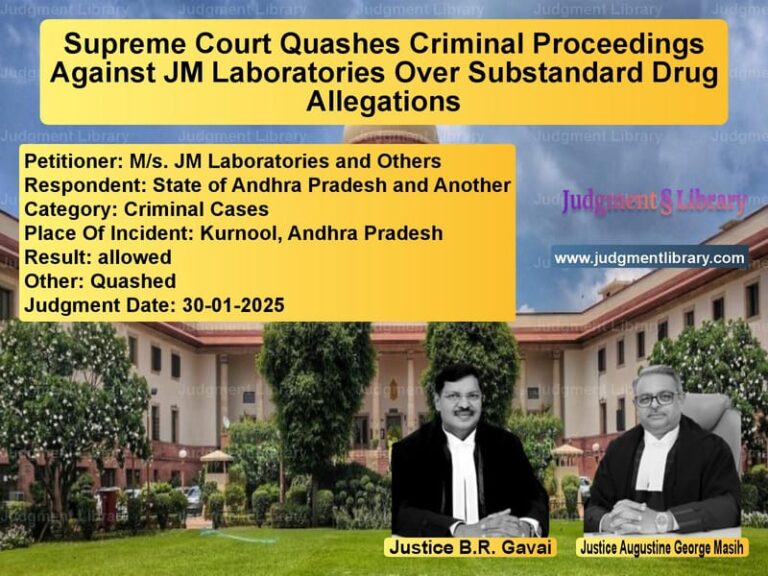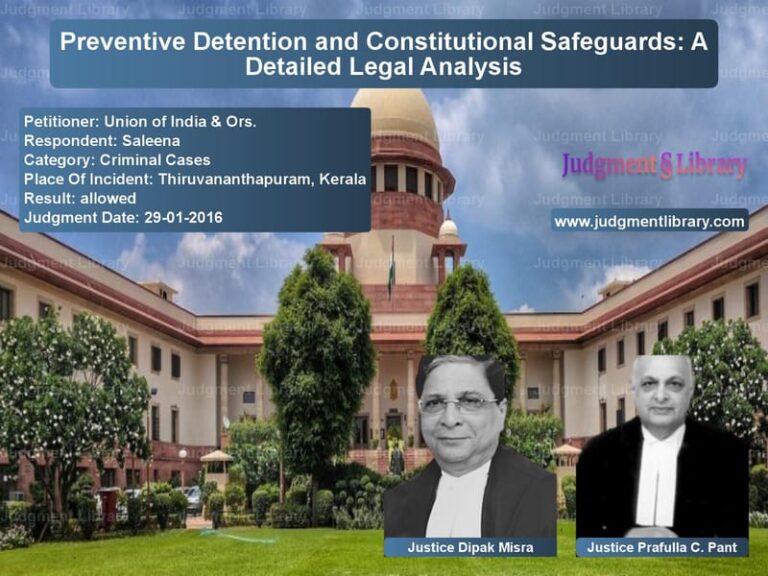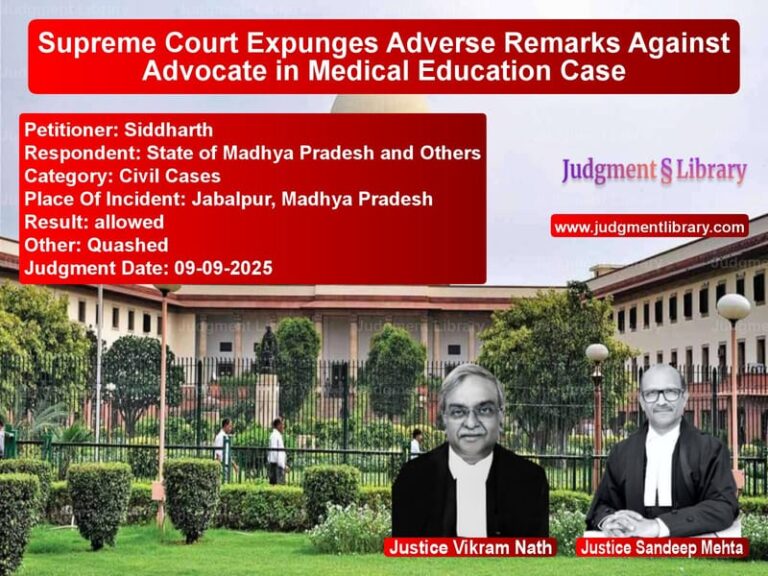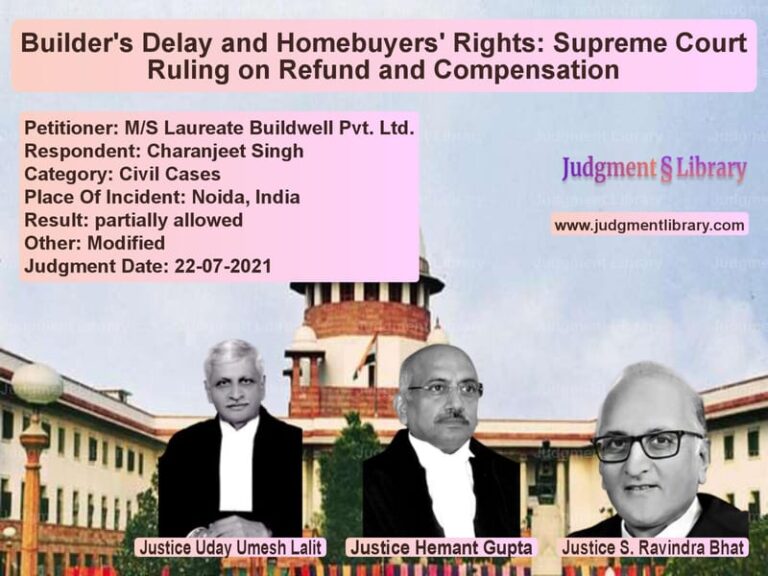Supreme Court Rules on Limitation and Pre-Existing Dispute in IBC Proceedings
The Supreme Court of India recently ruled in the case of Sabarmati Gas Limited vs. Shah Alloys Limited, addressing two crucial legal questions under the Insolvency and Bankruptcy Code, 2016 (IBC). The case dealt with the computation of the limitation period for filing an application under Section 9 of the IBC and whether a ‘pre-existing dispute’ between the parties warranted dismissal of the insolvency application.
Background of the Case
The appellant, Sabarmati Gas Limited, had entered into a Gas Sales Agreement (GSA) with the respondent, Shah Alloys Limited, for the supply of natural gas. The respondent failed to make payments from November 2011, leading to outstanding dues of ₹4.71 crores.
Meanwhile, Shah Alloys Limited was declared a ‘sick unit’ by the Board for Industrial and Financial Reconstruction (BIFR) under the Sick Industrial Companies (Special Provisions) Act, 1985 (SICA). Section 22 of SICA placed a moratorium on legal proceedings against sick companies, preventing the appellant from initiating recovery proceedings.
On December 1, 2016, SICA was repealed, and several sections of the IBC, including Sections 8 and 9, came into effect. The appellant issued a demand notice under Section 8 of the IBC on April 1, 2017, demanding the unpaid dues. The respondent replied on April 10, 2017, denying liability and raising a dispute regarding gas supply shortfalls.
The appellant then filed an application under Section 9 of the IBC before the National Company Law Tribunal (NCLT), Ahmedabad, which dismissed the application, citing two grounds:
- The claim was barred by limitation.
- A pre-existing dispute existed between the parties.
The appellant appealed to the National Company Law Appellate Tribunal (NCLAT), which upheld the NCLT’s decision. The matter was then brought before the Supreme Court.
Arguments by the Appellant (Sabarmati Gas Limited)
- The appellant argued that the limitation period should exclude the time during which legal proceedings were barred under Section 22(1) of SICA.
- Since SICA was repealed on December 1, 2016, the period between August 31, 2010 (when the respondent was declared a sick unit) and December 1, 2016, should be excluded from the limitation computation.
- Without such exclusion, the appellant would have been unfairly deprived of its right to seek legal remedies.
- The respondent’s reply to the demand notice did not raise a bona fide dispute, as it merely referred to a shortfall in gas supply without supporting evidence.
Arguments by the Respondent (Shah Alloys Limited)
- The respondent contended that the claim was time-barred since the default occurred in November 2011, and the Section 9 application was filed only in August 2018, exceeding the three-year limitation period under the Limitation Act, 1963.
- The bar under Section 22 of SICA only suspended legal proceedings but did not stop the limitation period from running.
- The respondent had consistently disputed the dues, both in its reply to the demand notice and in letters sent as early as January 4, 2013.
- The existence of such disputes warranted dismissal of the Section 9 application under the principles laid down in Mobilox Innovations Pvt. Ltd. vs. Kirusa Software Pvt. Ltd. (2018).
Supreme Court’s Observations
- “The period during which legal proceedings are barred under Section 22(1) of SICA should be excluded when computing limitation under the IBC.”
- “However, limitation under the IBC is governed by Article 137 of the Limitation Act, 1963, which prescribes a three-year period from when the right to apply accrues.”
- “In cases where the operational creditor was unable to take legal action due to a statutory bar, the delay may be condoned under Section 5 of the Limitation Act if sufficient cause is shown.”
- “The presence of a genuine pre-existing dispute negates the initiation of the Corporate Insolvency Resolution Process (CIRP).”
- “A pre-existing dispute need not be adjudicated before the demand notice is issued, but there must be material evidence to demonstrate its existence prior to the initiation of IBC proceedings.”
Final Judgment
- The Supreme Court dismissed the appeal, holding that the Section 9 application was barred by limitation.
- The Court ruled that even if the period under SICA was excluded, the application was filed more than three years after the default.
- The existence of a pre-existing dispute was confirmed based on correspondence between the parties and the respondent’s claims before the BIFR.
- The judgment upheld the NCLT and NCLAT’s findings that the IBC was not meant to be used as a debt recovery mechanism when disputes were present.
Legal Precedents Considered
- Mobilox Innovations Pvt. Ltd. vs. Kirusa Software Pvt. Ltd. (2018): Clarified that a pre-existing dispute bars initiation of CIRP.
- B.K. Educational Services Pvt. Ltd. vs. Parag Gupta & Associates (2019): Established that IBC applications must adhere to limitation rules under the Limitation Act, 1963.
- Paramjeet Singh Patheja vs. ICDS Ltd. (2006): Examined the impact of SICA’s statutory moratorium on legal proceedings.
- Babulal Vardharji Gurjar vs. Veer Gurjar Aluminium Industries Pvt. Ltd. (2020): Reinforced that IBC does not allow the revival of time-barred claims.
Implications of the Judgment
- The ruling clarifies that the limitation period for filing IBC applications is governed strictly by the Limitation Act, 1963.
- Creditors cannot rely on past legal bars to indefinitely extend their right to initiate insolvency proceedings.
- Pre-existing disputes remain a crucial ground for dismissal of insolvency applications, ensuring that IBC is not used for mere debt recovery.
- The judgment strengthens the principle that CIRP cannot be initiated as a substitute for enforcing contractual claims.
Conclusion
The Supreme Court’s ruling reinforces the importance of adhering to limitation laws and recognizing pre-existing disputes in IBC proceedings. By dismissing the appeal, the Court has provided greater clarity on the interplay between the IBC, SICA, and limitation laws, ensuring that insolvency proceedings are used as a genuine mechanism for resolution rather than as a means of debt enforcement.
Petitioner Name: Sabarmati Gas Limited.Respondent Name: Shah Alloys Limited.Judgment By: Justice C.T. Ravikumar, Justice Ajay Rastogi.Place Of Incident: Ahmedabad, Gujarat.Judgment Date: 04-01-2023.
Don’t miss out on the full details! Download the complete judgment in PDF format below and gain valuable insights instantly!
Download Judgment: sabarmati-gas-limite-vs-shah-alloys-limited-supreme-court-of-india-judgment-dated-04-01-2023.pdf
Directly Download Judgment: Directly download this Judgment
See all petitions in Bankruptcy and Insolvency
See all petitions in Corporate Compliance
See all petitions in Judgment by C.T. Ravikumar
See all petitions in Judgment by Ajay Rastogi
See all petitions in dismissed
See all petitions in Quashed
See all petitions in supreme court of India judgments January 2023
See all petitions in 2023 judgments
See all posts in Corporate and Commercial Cases Category
See all allowed petitions in Corporate and Commercial Cases Category
See all Dismissed petitions in Corporate and Commercial Cases Category
See all partially allowed petitions in Corporate and Commercial Cases Category







